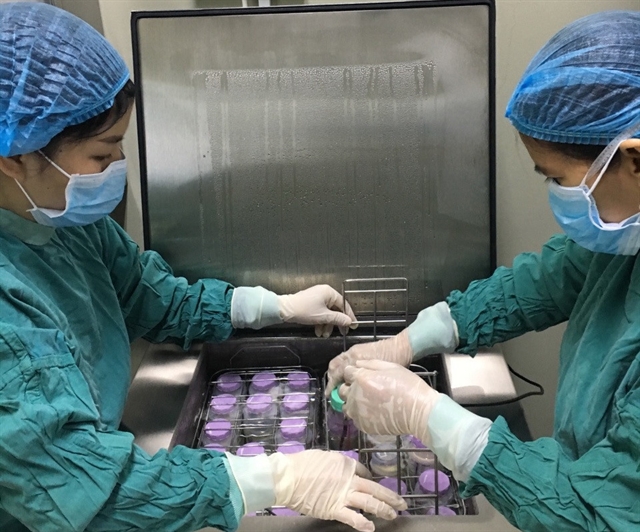 Society
Society

Lê Thị Thanh Hương is on her way to the bank to make a withdrawal. But instead of taking out cash, she travels 16 kilometres to withdraw breast milk.

|
| Volunteers store the donated breast milk in the bank. — Photo thanhnien.vn |
ĐÀ NẴNG — Lê Thị Thanh Hương is on her way to the bank to make a withdrawal.
But instead of taking out cash, she travels 16 kilometres to withdraw breast milk.
Hương is a volunteer of the Việt Nam’s first breast milk bank under the Đà Nẵng Hospital for Women and Children.
She said the donor was Hồ Mẫn Liên, of Hoà Cường Bắc Ward, Hải Châu District. Liên started to donate her breast milk last year after she gave birth to her first child. She has donated nearly 70 litres so far.
“The breast milk is believed to be a precious gift, helping newborn and premature babies in the hospital to strengthen their resistance against diseases,” Hương said.
Another volunteer, Trương Thị Khánh Ly, is a nurse at the hospital. She spends her lunch break travelling 30km from Hội An Ancient Town to take breast milk from Bùi Thị Thuý Lan – a “VIP” donor, who already gave more than 105 litres in seven months.
Around 400 mothers have passed strict hygiene and safety tests to allow them to donate milk to the bank, helping hundreds of newborn babies, especially those who are ill.
It is estimated about 50 volunteers like Hương and Ly, now working for the milk bank. They are medical staff of the hospital, Thanh Niên (Young People) newspaper reported.
They are divided into three groups to cover all districts of the city and manage the list of donors. The volunteers are tasked to receive and transport the milk after the donor contacts the milk bank’s hotline.
The volunteers are given specialised bags and a hygiene kit to store the breast milk at the correct temperature.
Each trip must take no longer than two hours to ensure the quality of the milk. After the breast milk is transported to the milk bank, it will be sterilised and stored.
Data shows nearly 5,450 litres of breast milk have been donated so far.
11,000 babies benefit from donated breast milk.
Nearly 11,000 babies have benefited from the milk bank in the past three years, said Nguyễn Thị Thu Phương, deputy head of the hospital’s Neonatal Department.
Premature babies and ill newborn babies, whose parents were poor, would receive the free milk from the bank, she said.
Additionally, the donated breast milk would be provided to the babies in the hospital, who need help when their mother was ill or had not enough breast milk.
There is a small fee to cover sterilisation and preservation of VNĐ130,000 (US$4.3) per 100ml, she said, with the money being used to pay for equipment and maintain the storage facility.
Lê Đức Toàn, secretary of the hospital’s Youth Union, said the bank’s volunteer team was expected to be developed into a network with its supports outside the hospital, aiming to help more babies in the future.
The Việt Nam’s first breast milk bank opened on February 6, 2017 after the Đà Nẵng Department of Health and the hospital worked with international organisations to highlight the importance of breast milk and the ability milk banks to offer a solution for optimal growth and development of children.
The hospital is one of leading hospitals in the field of paediatrics and obstetrics nationwide. It welcomes 13,000-15,000 births each year.
According to the World Health Organisation, breast milk is the natural first food for babies, it provides all the energy and nutrients that the infant needs for the first months of life, and it continues to provide up to half or more of a child’s nutritional needs during the second half of the first year, and up to one-third during the second year of life.
Breast milk promotes sensory and cognitive development, and protects the infant against infectious and chronic diseases. Exclusive breastfeeding reduces infant mortality due to common childhood illnesses such as diarrhoea or pneumonia, and helps for a quicker recovery during illness. —VNS